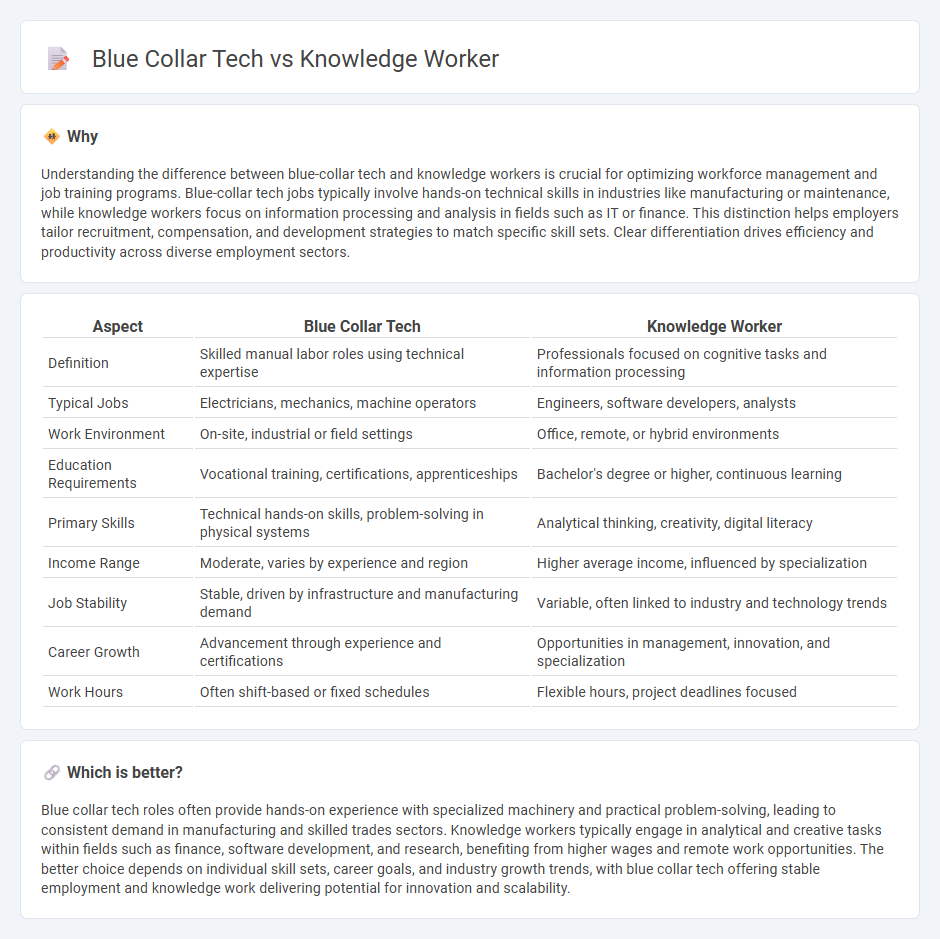
Blue collar tech roles involve skilled manual labor incorporating advanced technologies like robotics and computer-aided machinery, focusing on hands-on expertise in sectors such as manufacturing and construction. Knowledge workers specialize in processing and analyzing information, utilizing intellectual capabilities in fields like IT, finance, and research. Explore the evolving dynamics between these employment categories to understand their impact on the workforce.
Why it is important
Understanding the difference between blue-collar tech and knowledge workers is crucial for optimizing workforce management and job training programs. Blue-collar tech jobs typically involve hands-on technical skills in industries like manufacturing or maintenance, while knowledge workers focus on information processing and analysis in fields such as IT or finance. This distinction helps employers tailor recruitment, compensation, and development strategies to match specific skill sets. Clear differentiation drives efficiency and productivity across diverse employment sectors.
Comparison Table
| Aspect | Blue Collar Tech | Knowledge Worker |
|---|---|---|
| Definition | Skilled manual labor roles using technical expertise | Professionals focused on cognitive tasks and information processing |
| Typical Jobs | Electricians, mechanics, machine operators | Engineers, software developers, analysts |
| Work Environment | On-site, industrial or field settings | Office, remote, or hybrid environments |
| Education Requirements | Vocational training, certifications, apprenticeships | Bachelor's degree or higher, continuous learning |
| Primary Skills | Technical hands-on skills, problem-solving in physical systems | Analytical thinking, creativity, digital literacy |
| Income Range | Moderate, varies by experience and region | Higher average income, influenced by specialization |
| Job Stability | Stable, driven by infrastructure and manufacturing demand | Variable, often linked to industry and technology trends |
| Career Growth | Advancement through experience and certifications | Opportunities in management, innovation, and specialization |
| Work Hours | Often shift-based or fixed schedules | Flexible hours, project deadlines focused |
Which is better?
Blue collar tech roles often provide hands-on experience with specialized machinery and practical problem-solving, leading to consistent demand in manufacturing and skilled trades sectors. Knowledge workers typically engage in analytical and creative tasks within fields such as finance, software development, and research, benefiting from higher wages and remote work opportunities. The better choice depends on individual skill sets, career goals, and industry growth trends, with blue collar tech offering stable employment and knowledge work delivering potential for innovation and scalability.
Connection
Blue collar tech workers and knowledge workers are interconnected through the increasing reliance on digital tools and data analytics in traditional labor sectors. Automation and smart technologies require blue collar workers to collaborate closely with IT specialists and engineers to optimize operational efficiency. This synergy enhances productivity by combining practical skills with technical expertise in industries like manufacturing, construction, and logistics.
Key Terms
Skill Specialization
Knowledge workers excel in skill specialization through advanced education and analytical expertise, often engaging in tasks requiring critical thinking and problem-solving within fields like IT, finance, and research. Blue collar tech workers specialize in hands-on technical skills such as machinery operation, equipment maintenance, and technical installation, emphasizing practical experience and vocational training. Discover how these distinct skill specializations shape workforce dynamics and career development.
Work Environment
Knowledge workers typically operate in office settings equipped with computers, ergonomic furniture, and digital collaboration tools aimed at enhancing cognitive tasks and data analysis. Blue collar tech workers often work in more physically demanding environments such as factories, construction sites, or repair facilities, utilizing specialized equipment and technology for hands-on technical tasks. Explore in-depth comparisons of work environment dynamics to understand how technology influences these distinct job settings.
Task Autonomy
Task autonomy significantly differs between knowledge workers and blue-collar tech employees, impacting job satisfaction and productivity. Knowledge workers, such as software developers and analysts, typically enjoy higher task autonomy, enabling creative problem-solving and innovative approaches. Explore in-depth comparisons of task autonomy to optimize workforce strategies and enhance employee engagement.
Source and External Links
Knowledge Workers - Definition, What They Do, Who - Knowledge workers are high-level professionals who apply theoretical and analytical knowledge obtained through formal education to create products and services, including IT specialists, engineers, lawyers, and scientists, and are valued for their creativity and problem-solving skills in modern organizations.
What Is a Knowledge Worker and What Do They Do ... - A knowledge worker is a professional who "thinks for a living" by leveraging expertise and education to strategize, plan, and direct work activities, differentiating them from information or task workers who execute tasks based on their guidance.
What is a knowledge worker and what do they do? - Knowledge workers generate organizational value through expertise and critical thinking, creating new information from existing data, and are distinguished from information workers who perform tasks applying information; the term was coined by Peter Drucker in 1959 highlighting their importance in the digital workplace.
 dowidth.com
dowidth.com